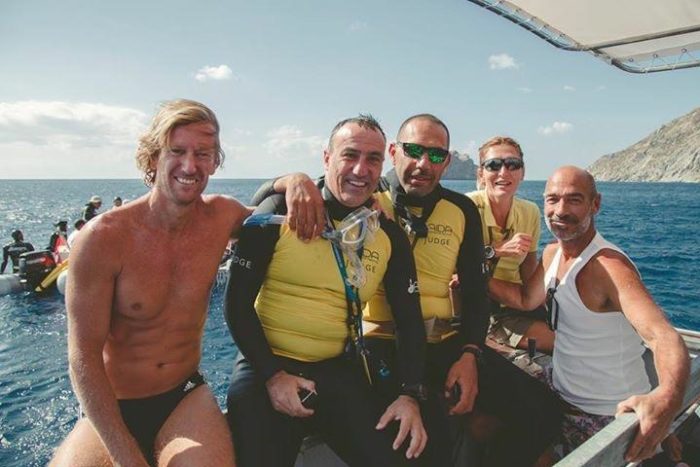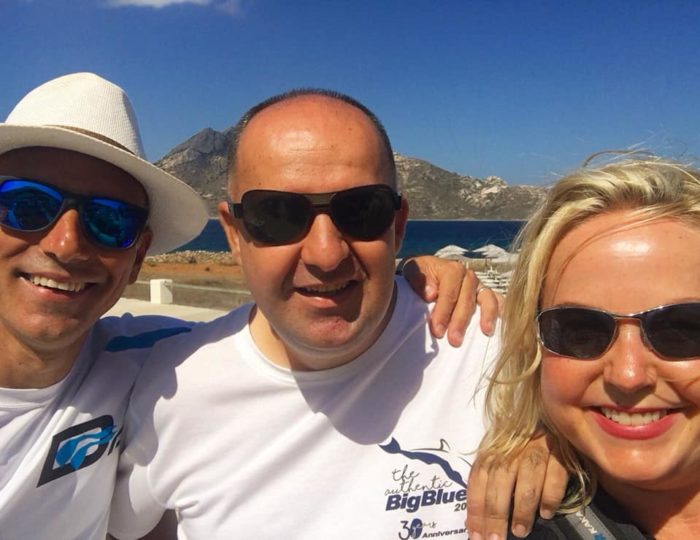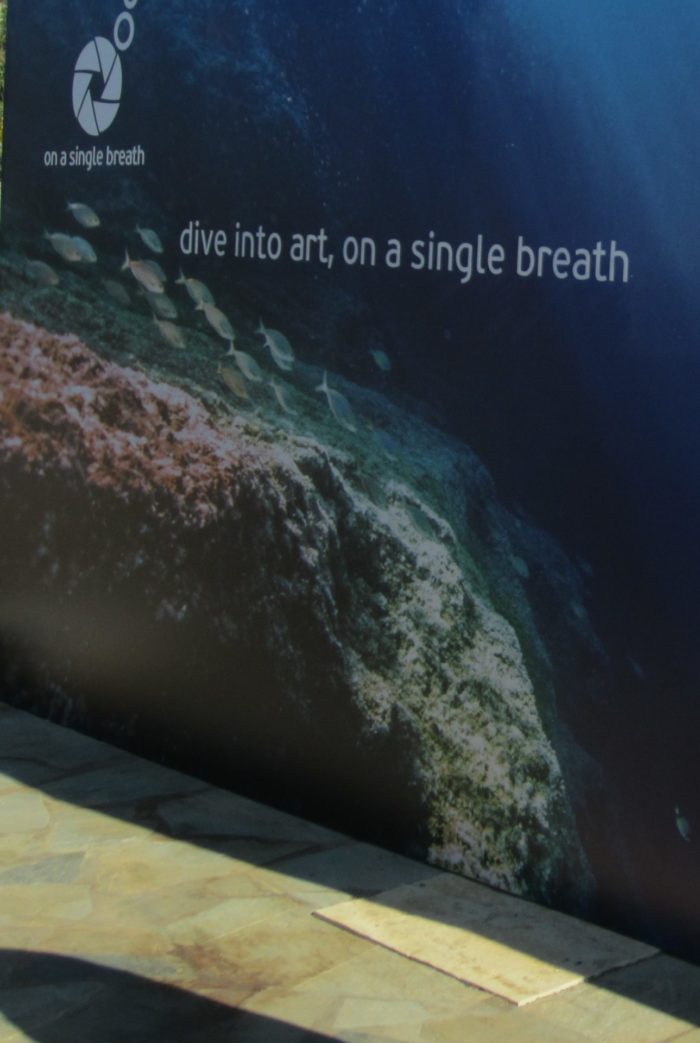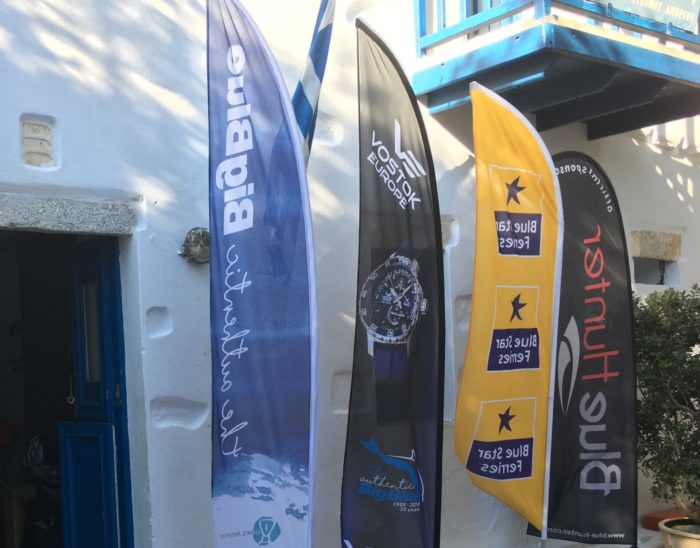Interview 4: Sport event value co-creation as symbolic world-making
Northern Notes interviews Dr Vassilios Ziakas and Professor Christine Lundberg about their ongoing research on Amorgos' landmark freediving event inspired by Luc Besson's film Big Blue.

The free-diving event held on the Greek island of Amorgos commemorates Luc Besson’s film, Big Blue (1988). Image creator: Vassilios Ziakas.
Dr Vassilis Ziakas: Independent Scholar and Consultant (email: v_ziakas@yahoo.co.uk).
Professor Marie Christine Lundberg: The Faculty of Social Sciences, Norwegian Hotel Academy, University of Stavanger (email: christine.lundberg@uis.no).
Dr Ziakas and Professor Lundberg investigate how the convergence of sport and cinema enhances the socio-cultural dynamics and means of symbolic action shaping a free-diving event held on the Greek island of Amorgos that commemorates the Luc Besson’s film, Big Blue (1988), shot for the most part on this island. The event celebrates the film’s legacy for free-diving itself and for the island as a tourism destination, while being able to foster networks of sociality among fans and participants by exemplifying a popular culture lifestyle tied to global free-diving ideals and imaginaries that can be concisely described as ‘embodied mobilities on a Single Breath’.

The project's full research team from left to right: Giorgos Sakkas, Vassilios Ziakas & Christine Lundberg. Image creator: Vassilios Ziakas.
What is the central argument in your project?
Mainstream sport and art are universal expressive practices of popular culture. However, they are studied separately as if they were alien areas and not sharing a common ground. They are approached individually by different disciplines, which do not usually inform one another. There is little interdisciplinary understanding of how they can be harmonized under the rubric of popular culture to enhance shared meanings and their effects on people. In this study, thus, we took the challenge of looking at the synergy between sport and cinema within the space of a small-scale free-diving event that commemorates a film’s legacy. The underlying purpose of our investigation was to uncover the social, symbolic and functional layers that shape the event and the lived experience of participants. This entailed the integration of a functionalist perspective on event value co-creation with a dramatological view explaining how shared meaning is rendered through the instantiation of symbols and their embodied performances.
Central in our analysis is the Turnerian notion of social drama that characterises collective-ritual performances, which especially when enacted away from home suspend more easily mundane reality and bring participants closer to alternate realities. Put otherwise, participants enter a liminoid border-zone composed of both the act of travelling and transitory event-space. The event is construed as a social drama producing an array of interconnected polysemic, hedonic, atmospheric and imaginative effects. By understanding this dramaturgic process that we coin ‘symbolic world-making’, we attempted to show how kinship links among participants are reconstituted and strengthened within the touristic event-space – our use of dramaturgy was intended to capture how event participants parade and celebrate their lifestyle-identity through means of symbolic action and metaphoric discourse, while prompting collective action and collaboration among different actors.
Accordingly, we built a framework for studying dramaturgy and co-creation. In this, we define event-dramaturgy as the extraction of shared meanings stemming from the co-performance of symbolic representations within the event-space. This dramatological lens accounts for how polysemic structures (made by symbols-narratives-genres) instantiate symbolic representations in embodied performances. Symbolic action is thus performatively and jointly experienced, nurturing a collaborative mindset that enables event co-creation processes. Our dramatological approach shifts attention to the mechanisms that is achieved. Most importantly, we take here a step forward moving from conventional and fragmentary dramaturgical applications to a more comprehensive and dialectical dramatological perspective that synthesises symbolic action and management pragmatism. We call therefore for comprehensive dramatological inquiries embracing the collective embodiment of events as social dramas that enable collaboration through the instantiation of shared meanings. Consequently, prospective readership is diverse cutting across sport, events, tourism, and socio-cultural studies.

Underwater Gallery 'On a Single Breath'. Image creator: Vassilios Ziakas.
What is, in your opinion, your work’s most important contribution to tourism studies?
Our fresh dramatological perspective demonstrates that events can become symbolic social spaces conducive to co-creation and collective action. Mainstream sport and cinema are facets of popular culture and can be synergised to optimise their effects on travelling-aficionados mainly because they combine two ontological states: reality (sport) and fantasy (cinema). The event provides a liminoid space for the convergence and performance of these ontological states. This affords the potential for event participants to explore alternate constructions and realities in a process of symbolic world-making.
Tourism research has overlooked the role of dramaturgy in events and collective performances. Our study provides an alternative view of the event as a choreographed stage of symbolic elements and their embodied performances, thereby shedding light on the internal logics of its design. This fills a wide gap in tourism scholarship and allied disciplines. It allows us to appreciate the networks of sociality that are formed within the lifestyle event-spaces of popular culture. We found in our studied event that instantiation of meaning is exemplified by the following embodiments of metaphoric discourse: statements about participants’ connectedness promote “modes of association,” projecting the event as “a way of being and becoming”; lived experiences of communion prompt “acts of fellowship,” envisioning the event as “a journey on a single breath”; affirmation of belongingness cements “blocks of cohesion” imagining through the event alternate “(sea-)worlds of discovery and solidarity”. The organic relatedness of these embodiments amplifies instantiation and gives shape to the dialectics between the ideal and the real. Put simply, we delineated how embodied mobilities, in our case free-diving travelling-aficionados, assign meaning to their activities and celebrate their belonging to the free-diving community.
On a practical level, our study suggests that the dramaturgic nature of an event may facilitate processes of co-creation and collaboration in its staging and delivery. Therefore, events if appropriately designed may act both as symbolic social spaces and collaborative platforms.

Event Office on Amorgos. Image creator: Vassilios Ziakas
Does your showcase work belong to a school of thought or a paradigm and why/how?
This work is integrative in nature. As such, it does not belong to a school of thought or a paradigm, but instead, integrates previously unconnected literature streams or webs of understanding. Value co-creation comes from marketing and Service-Dominant Logic. Dramaturgy originates in socio-cultural theory, ritual and performance studies. There is obviously a disconnect between these lines of thought although there are significant overlaps such as shared meaning and identity, social interaction and collective action. Within the contexts of sport, leisure, events and tourism in spite of the ubiquity of drama and symbolic action, applications of dramaturgy have been limited to Goffman’s symbolic interactionism approach interpreting individual and not collective behaviour, while marketing studies went as far as using the analogy of service as theatre. Even performance studies in the tourism field fail to clearly identify and elaborate on collective processes of dramaturgy. Similarly, film and media studies seem to focus on movie scripts and their performance or adaptation as dramaturgic elements. On the other hand, value co-creation re-centres social interaction and sociability in market exchanges but ignores aspects of drama and symbolic action. If we put into the picture popular culture and embodied mobilities asking what really connects participants (and how) to cooperate in staging a small-scale free-diving event, then the mosaic looks very convoluted.
Considering the above perspectives in understanding how modes of sociality are formed and performed within the event-space brings about the risk of speaking incomprehensibly to each other like we were in the Tower of Babel. To untangle possible confusion, we pinpoint as a common thread the need to better understand the cultural logics that instantiate meaning and order in the worlds of event-tourists. At the core here lies Turner’s notion of drama in collective-ritualistic performances that enables collective action for co-creation of alternate realities or imaginative worlds. We have also drawn on Schechner’s performance metaphor and Handelman’s interpretive approach on public events as dense concentrations of symbols that mirror and/or shape social orders. We need to go back to this literature, not to reproduce it, but to approach it with fresh eyes for envisioning potential integration and synergies. Towards this direction, we build a robust ground for further interdisciplinary analyses to examine the junction of social, symbolic, and management processes in events and tourism. Ultimately, we hope that this work will spur interest in integrative approaches of popular culture, drama, ritual, event mobilities and co-creation.
Is there an area in tourism scholarship that remains underdeveloped?
The relationship between popular culture and tourism is ill-defined, especially in terms of how its different expressive practices can be synergised for optimal effects. Likewise, it is not clear how drama interacts with, or affects non-representational aspects, for example atmospheres, to enhance the lived experience and shared meaning in sport and tourism. This is mainly because dramaturgic performance of community and metaphoric discourse through polysemic structures stemming from symbols/genres/narratives are not sufficiently examined in the tourism literature. The essence of dramaturgy as collective performance and instantiation is widely overlooked. As is its integration with pragmatist business and management takes on tourism. We need to find a balance in order to provide well-rounded accounts of social action and behaviour in tourist-lifestyle settings. Events and their spaces provide meta-commentaries for embodied mobilities but we know little about how meaning structures and lifestyle patterns intersect in helping to co-create social orders.
Our work stresses the need to start filling gaps in the above under-researched areas. It provides an integrative conceptual framework alongside interdisciplinary analytical tools. It brings to the fore how mobile socialities are shaped interpreting and co-creating the conditions that make up their identities and place to the real world, while envisioning ideal versions of world-making. Our dramatological analysis moves past conventional views that the drama enacted in collective settings merely reflects society or legitimizes established values. Rather, it denotes that dramaturgy triggers a dynamic co-creative process opening up new avenues of experience and understanding. To thoroughly appreciate this process, collective cultural performances and embodied mobilities should be analysed in relation to the symbolic social spaces within which they are enacted and their underlying polysemic, symbolic, and performative under-structure. Such a nuanced and multidimensional analysis may eventually uncover how communal drama enables collective action to redefine, reconfigure and recreate social spaces, relations, and systems. In this vein, we argue that drama is a fundamental form of social organisation that merits considerable research attention.
Dr Ziakas is Independent Scholar and Consultant and Professor Lundberg is Full Professor of Tourism Management at the University of Stavanger. The first article on their project (co-authored with freediver Giorgos Sakkas) is out in a few weeks:
Ziakas, V., Lundberg, C., & Sakkas, G. (2021). ‘Out of the Black, Into the Big Blue’ on a Single Breath: Sport event value co-creation as symbolic world-making. Journal of Sport Management, In Press, DOI: 10.1123/jsm.2020-0187.
